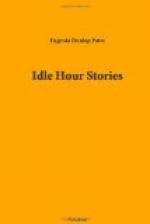“No, but I’d like to,” he said, and he meant it.
“She lives at the farm-house yonder—she and Uncle Reuben. They are the best old souls! So this is what you were doing,” she abruptly added, picking up the sketch. “You wouldn’t think I could draw, but I can,” with a proud little toss of the hair.
“I would think you could do anything,” he gallantly replied.
But she was intent upon the picture, with its bold, true outlines.
“This isn’t bad,” was her sage critcism.
“Didn’t you wear a hat, or something?” he asked, looking around and up into the tree.
“No—yes—I wore this,” and pulling from her pocket a large blue square of cotton, she tied it under her chin with the utmost naivete.
“It’s Aunt Hepsy’s,” she explained. “There, do you hear that bell? That’s for dinner,” and taking a tiny watch from an elf-like pocket, she added, “Only half-past eleven. But, to be sure, we ate breakfast with the chickens. It’s horrible.”
“Don’t you live here?”
“Live here?” she echoed. “No, I’m only visiting. Good-bye, I must go. I am much obliged, though,” and as if the recollection were overpowering, she again burst out into her ringing laugh.
“It was too funny you didn’t see me; and I so scared I was afraid to breathe. Good-bye, I hope you will have a good time with your picture.”
“But you are not going to dismiss me, are you? Mayn’t I take you home?”
“Yes, if you like; only you musn’t stay long. I’ve got to do Rollin and Plutarch while I’m out here, and can’t be bothered.”
With difficulty repressing an explosion, the young man walked beside the woodland sprite, with his goods and chattels thrown across his shoulders, and found himself falling—yes, tumbling—headlong in love. Such an airy, fairy, exquisite piece of humanity it had never been his fortune to behold.
“You are too young to worry your brain with dry old fossils like Rollin and Plutarch,” he said, with what gravity he could.
“I am a person of twenty,” she affirmed with demure satisfaction, as she tripped along in a manner quite enchanting.
At the door of the farm-house a fair, motherly face smiled a welcome from the border of a spotless cap, then sobered a little at the sight of a stranger.
“This is Aunt Hepsy,” simply said Daisy, “and you are—?” hesitating.
A flush not born of the sunshine mounted to his brow as with swift thought he saw the shoals ahead, and did not dare reveal his identity.
“John Smith,” he said, with his natural ease.
“Oh!” half exclaimed Daisy, upon hearing such a very common name from such very uncommon lips; but checking it, and softly humming a tune, she retired to an inner room to prepare for dinner.
This episode was the beginning of elysium for John Smith. Every day saw him at the farm-house. Every day revealed some new charm in the Daisy he had found. She was as industrious and sensible as she was petite and pretty. Rollin and Plutarch were discarded for modern authors, or for simple chit-chat about mamma, papa, and little ones at home.




